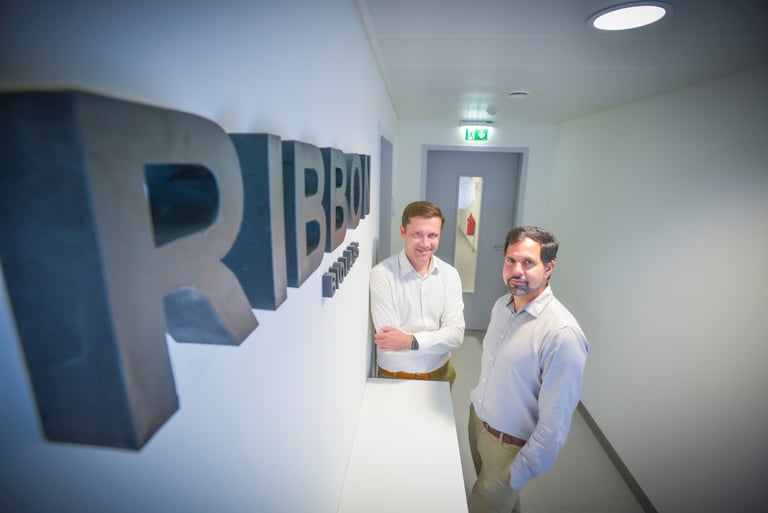Tecan uses cookies to improve our website. By continuing to browse our website, you accept our cookie policy.
Tecan uses cookies to improve our website. By continuing to browse our website, you accept our cookie policy.

Synthetic DNA has become the central component of countless scientific and technological innovations across many applications, from biopharmaceuticals to biofuels. However, research and drug development pipelines are often hindered by the cost and the length of time that it takes to obtain long sequences of DNA or multiple DNA variants. Ribbon Biolabs, based in Vienna, is addressing this issue by combining automation and adaptive algorithmic control with highly precise, optimized enzymatic synthesis.
Ribbon Biolabs is revolutionizing the production of long and complex DNA, using cutting-edge technologies to rapidly synthesize long, subgenomic polynucleotides at an affordable rate. Founded in 2018, the company is the result of geneticist and mathematician Dr Harold P de Vladar’s frustrations at the prohibitive cost and slow turnaround he encountered when procuring libraries of viral DNA variants for his own evolutionary genetics studies. Based in the Vienna region of Austria, Ribbon Biolabs is streamlining and automating the synthesis of DNA, and specializes in providing long DNA molecules or complex libraries of high fidelity variants, quickly and at an affordable price. Dr Marc J Brehme, Chief Technology Officer at Ribbon Biolabs, explained: “Our mission is to make long DNA accessible at a scale previously unseen in the industry, driving the development of scientific and translational research across all fields of biotechnology. We focus on the synthesis of complex products, providing long, subgenomic DNA strands – 10,000 base pairs or longer – and entire libraries containing multiple variations of a molecule. Traditionally, this is something that has been expensive and difficult to obtain, with very little guarantee of success. Equally important, researchers often had to wait weeks or even months before receiving their materials, which is a long time to wait for any project in the pharmaceutical industry. At Ribbon Biolabs, we have combined automation with an innovative enzymatic approach to speed up this process, providing accurate, fast and affordable DNA synthesis, to empower biopharmaceutical and biotechnology customers across academia and industry.” Harold, Ribbon Biolabs’ Founder and CEO, said: “We are bringing the Ford model to the automated synthesis of long DNA, at a scale that is unprecedented in the industry.”
 Dr Marc Brehme, CTO, and Dr Harold P de Vladar, CEO, of Ribbon Biolabs
Dr Marc Brehme, CTO, and Dr Harold P de Vladar, CEO, of Ribbon Biolabs
Marc continued: “Coming from a systems biology and biotech background, I joined the company in 2019 to oversee tech development and workflow automation. We initially began by creating a concept process and developing a proprietary algorithm-based pipeline that would enable us to synthesize bespoke DNA sequences for each customer. This was combined with customized automation platforms to help increase the throughput, multiplexing and robustness of the workflow. We procured a Fluent® Automation Workstation to fit into this workflow because we needed a robust multifunctional liquid handling solution that was both convenient and affordable. The set-up process in cooperation with Tecan was smooth and efficient, and the company was very helpful in providing custom drivers for the integration of other modules with the platform.”
“As the evolution of our automated workflow progressed, we decided to join the beta testing team for the Frida Reader™. We were interested in the possibility of incorporating a spectrophotometric reader with a small footprint into our instrument because we wanted to have real-time measurements of our synthesis process to enable full use of adaptive control and feed data back to our algorithms. This newly developed system offered the capability to perform the necessary absorbance measurements without sample loss. This is an important consideration for us, as the long DNA products we generate are valuable, so it is highly desirable that we avoid sample loss throughout the process. The principle of obtaining measurements from a hanging drop – while keeping our sample volume unchanged – was therefore extremely appealing. Furthermore, the Frida Reader has a very small footprint for ease of integration, offering us a fully automated workflow that combines standard liquid handling functions with the measurement and processing of samples – such as concentration adjustments – in a seamless manner. This is simply unachievable with conventional lab robotics.”
“Our Tecan instruments have been crucial additions to our platform,helping to streamline parts of our workflow and enabling successful automation of our core processes. Automating every step of this pipeline without the need for manual interaction differentiates us from competing technologies and has been a key part of our success. It avoids human errors and increases walkaway times, freeing up laboratory technicians and reducing costs. This also helps to significantly improve our turnaround times to offer fast and accurate long DNA products at a highly competitive price. Recently, we were excited to announce a significant milestone for the company, underlining our technology’s capability and potential. Using our proprietary FullGenes platform, the team produced a linear, synthetic double-stranded DNA product with a record length of 10kbp. This technological breakthrough will help us to provide our customers with faster access to synthetic long DNA, boosting future scientific developments and accelerating the research of novel products, such as next generation biopharmaceuticals.”
Our Tecan instruments have been crucial additions to our platform, helping to streamline parts of our workflow and enabling successful automation of our core process.
For Research Use Only. Not for use in diagnostic procedures.
To learn more about Ribbon Biolabs, go to ribbonbiolabs.com
To find out more about Tecan’s Frida Reader, visit tecan.com/fridareader
To find out more about Tecan’s Fluent Automation Workstation, visit tecan.com/fluent